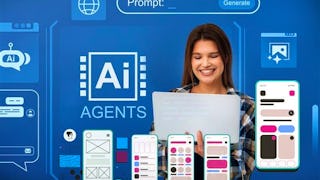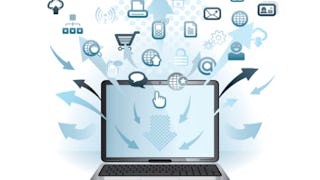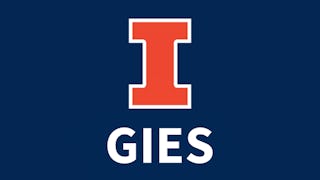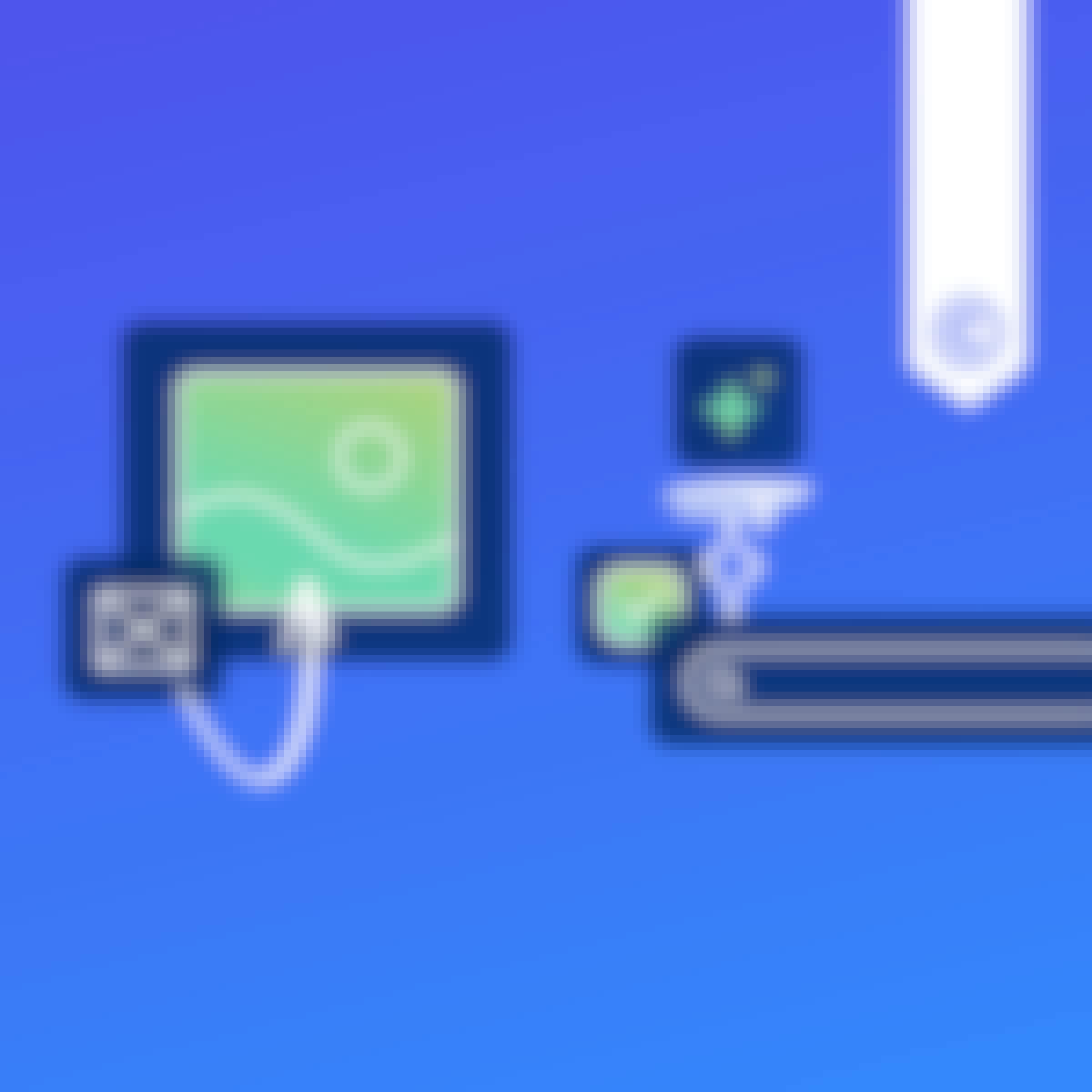- Browse
- Prototyping
Results for "prototyping"
 Status: Free TrialFree TrialA
Status: Free TrialFree TrialAArizona State University
Skills you'll gain: Engineering Design Process, Engineering Drawings, Basic Electrical Systems, Prototyping, Drafting and Engineering Design, Mechanical Drawings, Computer-Aided Design, Electronics, Technical Drawing, Electronic Components, Robotics, Manufacturing Processes, Electrical Systems, Electronic Hardware, Electrical Wiring, Electrical Engineering, Materials science, Manufacturing and Production, Mechanical Engineering, 3D Modeling
4.9·Rating, 4.9 out of 5 stars54 reviewsBeginner · Specialization · 3 - 6 Months
 Status: Free TrialFree Trial
Status: Free TrialFree TrialSkills you'll gain: Figma (Design Software), User Experience Design, Mockups, User Centered Design, Usability Testing, User Interface (UI) Design, Design Elements And Principles, Interaction Design, Prototyping, Technical Communication, Typography, Layout Design, Color Theory
4.8·Rating, 4.8 out of 5 stars4.8K reviewsBeginner · Course · 1 - 3 Months
 Status: Free TrialFree TrialA
Status: Free TrialFree TrialAArizona State University
Skills you'll gain: Engineering Design Process, Prototyping, Engineering Drawings, Product Design, Product Development, Hardware Design, Research and Design, 3D Modeling, Mockups, Industrial Design, Development Testing, Computer-Aided Design, Usability Testing, Design Specifications, Manufacturing Processes, Cost Estimation, Materials science, Ideation, Mechanical Engineering, User Feedback
4.6·Rating, 4.6 out of 5 stars120 reviewsBeginner · Specialization · 1 - 3 Months
 Status: NewNewStatus: Free TrialFree Trial
Status: NewNewStatus: Free TrialFree TrialSkills you'll gain: UI/UX Research, User Interface and User Experience (UI/UX) Design, User Experience, User Centered Design, Usability, Responsive Web Design, User Flows, User Interface (UI), UI Components, Figma (Design Software), Wireframing, Design Research, Prototyping, Persona (User Experience), Usability Testing, Design Software, Human Centered Design, Ideation, Brainstorming, Animations
4.8·Rating, 4.8 out of 5 stars66 reviewsBeginner · Specialization · 3 - 6 Months
 Status: Free TrialFree TrialU
Status: Free TrialFree TrialUUniversity of California San Diego
Skills you'll gain: Design Research, User Experience Design, User Research, Prototyping, User Centered Design, Persona (User Experience), Interaction Design, Usability Testing, Research Methodologies, Innovation, Creativity, Storyboarding, Interviewing Skills
4.6·Rating, 4.6 out of 5 stars905 reviewsMixed · Course · 1 - 4 Weeks
 Status: Free TrialFree TrialU
Status: Free TrialFree TrialUUniversity of Illinois Urbana-Champaign
Skills you'll gain: 3D Modeling, Design Thinking, Autodesk, Design Software, 3D Assets, Creative Thinking, Intellectual Property, Conceptual Design, Hardware Troubleshooting, Computer-Aided Design, Visualization (Computer Graphics), Product Design, Computer Hardware, Innovation, Solution Design, Manufacturing Processes, Computer Graphics, Prototyping, Emerging Technologies, Business Transformation
4.6·Rating, 4.6 out of 5 stars2.4K reviewsBeginner · Specialization · 3 - 6 Months
What brings you to Coursera today?
 Status: Free TrialFree Trial
Status: Free TrialFree TrialSkills you'll gain: Innovation, Ideation, New Product Development, Business Strategies, Design Thinking, Business Strategy, Brainstorming, Product Development, Entrepreneurship, Resource Management, Market Opportunities, Business Research, Critical Thinking
Beginner · Course · 1 - 4 Weeks
 Status: Free TrialFree TrialA
Status: Free TrialFree TrialAArizona State University
Skills you'll gain: Prototyping, Manufacturing Processes, Materials science, Manufacturing and Production, Mechanical Engineering, 3D Modeling, Safety Training, Personal protective equipment
5·Rating, 5 out of 5 stars22 reviewsBeginner · Course · 1 - 4 Weeks
 Status: Free TrialFree Trial
Status: Free TrialFree TrialSkills you'll gain: Responsive Web Design, Figma (Design Software), Prototyping, Mockups, User Interface (UI), Interaction Design, Usability, User Experience Design, User Flows, Animations
Intermediate · Course · 1 - 4 Weeks
 Status: Free TrialFree TrialU
Status: Free TrialFree TrialUUniversity of Maryland, College Park
Skills you'll gain: Product Development, New Product Development, Wireframing, Product Design, User Experience Design, Prototyping, Design Thinking, Conceptual Design, Product Testing, Project Management, Product Management, Agile Methodology
4.2·Rating, 4.2 out of 5 stars100 reviewsBeginner · Course · 1 - 3 Months
 Status: Free TrialFree Trial
Status: Free TrialFree TrialSkills you'll gain: User Story, Information Architecture, UI/UX Research, User Research, User Interface and User Experience (UI/UX) Design, Design Thinking, User Experience, Agile Software Development, Scrum (Software Development), User Centered Design, Agile Methodology, Usability, Usability Testing, Responsive Web Design, User Interface (UI), Figma (Design Software), Wireframing, Design Research, Prototyping, Persona (User Experience)
4.8·Rating, 4.8 out of 5 stars2.8K reviewsBeginner · Professional Certificate · 3 - 6 Months
 Status: Free TrialFree TrialU
Status: Free TrialFree TrialUUniversity of Michigan
Skills you'll gain: UI/UX Research, Surveys, Qualitative Research, Usability Testing, User Experience Design, User Research, User Experience, User Story, Prototyping, Wireframing, User Centered Design, Survey Creation, Sampling (Statistics), Design Research, Interaction Design, Ideation, A/B Testing, Conceptual Design, Web Analytics, Usability
4.7·Rating, 4.7 out of 5 stars2.3K reviewsBeginner · Specialization · 3 - 6 Months
In summary, here are 10 of our most popular prototyping courses
- Rapid Prototyping and Tooling: Arizona State University
- Create High-Fidelity Designs and Prototypes in Figma: Google
- Rapid Prototyping Using 3D Printing: Arizona State University
- UI/UX Design Fundamentals & Prototyping with Generative AI: SkillUp
- User Experience: Research & Prototyping: University of California San Diego
- 3D Printing and Additive Manufacturing: University of Illinois Urbana-Champaign
- Business Innovation: Prototyping, Markets, Strategy: Coursera
- Rapid Prototyping Materials and Tooling: Arizona State University
- Interaction Intelligence: Advanced Prototyping with Figma: Coursera
- Creative Design, Prototyping, and Testing: University of Maryland, College Park
Frequently Asked Questions about Prototyping
Prototyping is the process of creating a preliminary model or sample of a product to test and validate ideas before full-scale production. It plays a crucial role in design and development across various fields, including software, product design, and engineering. By allowing designers and developers to visualize concepts, gather feedback, and make necessary adjustments early in the process, prototyping helps reduce risks, save time, and ensure that the final product meets user needs and expectations.
A variety of job opportunities exist in the field of prototyping. Positions may include product designer, UX/UI designer, prototype engineer, and innovation consultant. These roles often require collaboration with cross-functional teams to develop and refine products, making prototyping skills highly valuable in industries such as technology, manufacturing, and design. As businesses increasingly prioritize user-centered design, the demand for professionals skilled in prototyping continues to grow.
To excel in prototyping, you should develop a mix of technical and soft skills. Key technical skills include proficiency in design software such as Figma or Sketch, knowledge of 3D modeling tools, and an understanding of user experience principles. Additionally, soft skills like communication, collaboration, and critical thinking are essential for effectively working with teams and stakeholders. Familiarity with rapid prototyping techniques and methodologies can also enhance your capabilities in this area.
There are several excellent online courses available for those interested in learning about prototyping. For instance, the Rapid Prototyping and Tooling Specialization offers a comprehensive overview of prototyping techniques. Another option is the UI/UX Design Fundamentals & Prototyping with Generative AI Specialization, which focuses on integrating generative AI into the design process. These courses provide valuable insights and hands-on experience to help you build your prototyping skills.
Yes. You can start learning prototyping on Coursera for free in two ways:
- Preview the first module of many prototyping courses at no cost. This includes video lessons, readings, graded assignments, and Coursera Coach (where available).
- Start a 7-day free trial for Specializations or Coursera Plus. This gives you full access to all course content across eligible programs within the timeframe of your trial.
If you want to keep learning, earn a certificate in prototyping, or unlock full course access after the preview or trial, you can upgrade or apply for financial aid.
To learn prototyping effectively, start by identifying your specific interests within the field, whether it's product design, software development, or another area. Enroll in relevant online courses, such as those mentioned earlier, and engage in hands-on projects to apply what you learn. Additionally, seek feedback from peers or mentors to refine your skills. Regular practice and staying updated with industry trends will also contribute to your growth in prototyping.
Prototyping courses typically cover a range of topics, including design thinking, user experience principles, and various prototyping techniques. You may learn about tools like Figma and Sketch, as well as methods for creating low-fidelity and high-fidelity prototypes. Courses often emphasize the importance of user testing and iteration, helping you understand how to gather feedback and improve designs effectively.
For training and upskilling employees in prototyping, courses like Creative Design, Prototyping, and Testing can be particularly beneficial. These programs focus on practical skills and collaborative projects, making them ideal for team learning. Additionally, the From Prototyping to Validating Business Models course can help employees understand how to align prototyping efforts with business objectives, enhancing overall effectiveness in their roles.










